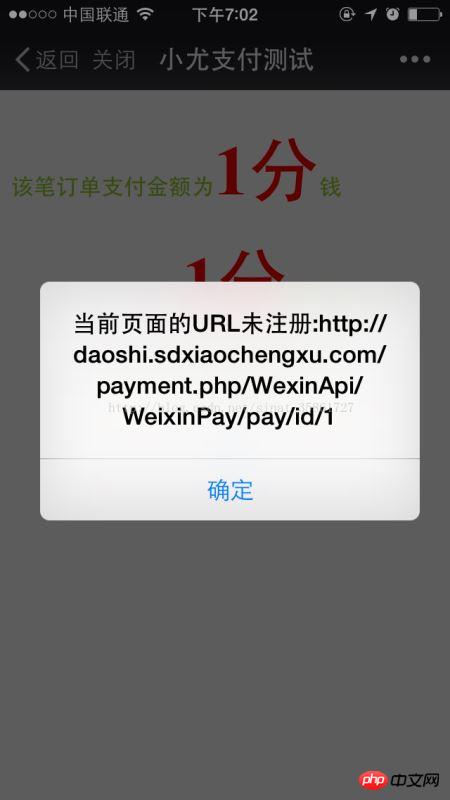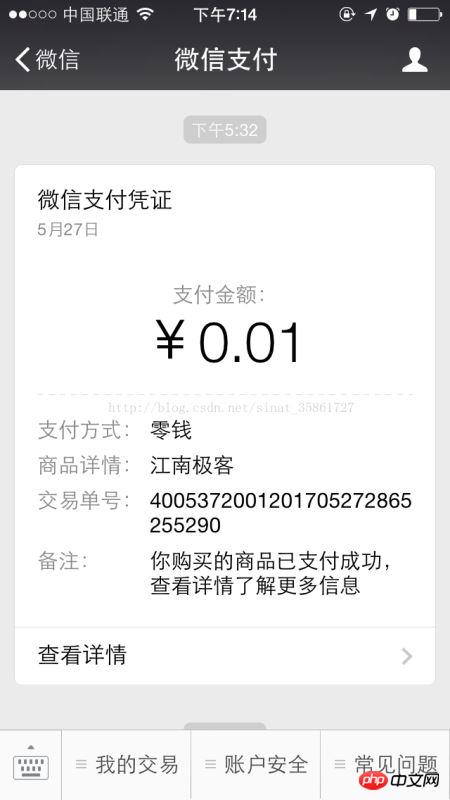Example of how ThinkPHP implements WeChat payment
This article mainly introduces to you the detailed tutorial of ThinkPHP implementation of WeChat payment (jsapi payment) process. Friends who need it can refer to it. I hope it can help everyone.
The SDK and documentation produced by Goose Factory are difficult to understand, and you will know it after using it. Shouldn’t the documentation and SDK be as simple and understandable as possible? Is it possible that only vigorous reconstruction can show the superb technology of Goose Factory programmers? Well...did I expose my rookie attributes...In fact, the SDK is quite easy to use, but as I saw in the previous article, the payment completion callback function is really confusing.
For those who don’t want to be bypassed by the official and want to use WeChat payment in TP, you can take a look at the payment SDK suitable for TP which was restructured and streamlined by a master based on the official documents. I downloaded the source code and read it. Well, the code is very elegant and concise, and the process is very simple and easy to understand. See the blog post for details: http://baijunyao.com/article/78
I still frowned, used the official SDK, and successfully implemented the payment. Let me share the process with you:
1.SDK download and modification
I won’t go into too much detail about this. If you don’t know, you can read my previous article: PHP implements WeChat payment (jsapi payment) process , which details which downloaded files need to be modified.
2. Public account settings
A. You still need to set the web page authorized domain name, this is nothing special;
B. Pay attention to this Payment authorization directory, using TP, many people use the rewrite mode (REWRITE mode) or use the pseudo-static mode while using the REWRITE mode. The generated link at this time is: http://serverName/Home/Blog/read /id/1 ;
If you are using PATHINFO mode, the generated link is: http://serverName/index.php/Home/Blog/read/id/1, such as under the Home module Use a method in the Blog controller to pay. The authorized directory for our payment should be http://serverName/Home/Blog/ or http://serverName/index.php/Home/Blog/, which is based on our own TP. Depends on the URL pattern set.
3. Payment process
(1) Unified order placement
The payment parameter configuration for order placement is basically different from the previous one. Change, the important thing to pay attention to is the payment callback verification link. Because it needs to be called multiple times, I encapsulated the parameter configuration directly in Application/Common/Common/function.php. My SDK is placed in the Api directory under the project root directory. , so the Vendor function is not used when introducing the SDK.
/**
* 微信支付
* @param string $openId openid
* @param string $goods 商品名称
* @param string $attach 附加参数,我们可以选择传递一个参数,比如订单ID
* @param string $order_sn 订单号
* @param string $total_fee 金额
*/
function wxpay($openId,$goods,$order_sn,$total_fee,$attach){
require_once APP_ROOT."/Api/wxpay/lib/WxPay.Api.php";
require_once APP_ROOT."/Api/wxpay/payment/WxPay.JsApiPay.php";
require_once APP_ROOT.'/Api/wxpay/payment/log.php';
//初始化日志
$logHandler= new CLogFileHandler(APP_ROOT."/Api/wxpay/logs/".date('Y-m-d').'.log');
$log = Log::Init($logHandler, 15);
$tools = new JsApiPay();
if(empty($openId)) $openId = $tools->GetOpenid();
$input = new WxPayUnifiedOrder();
$input->SetBody($goods); //商品名称
$input->SetAttach($attach); //附加参数,可填可不填,填写的话,里边字符串不能出现空格
$input->SetOut_trade_no($order_sn); //订单号
$input->SetTotal_fee($total_fee); //支付金额,单位:分
$input->SetTime_start(date("YmdHis")); //支付发起时间
$input->SetTime_expire(date("YmdHis", time() + 600));//支付超时
$input->SetGoods_tag("test3");
//$input->SetNotify_url("http://".$_SERVER['HTTP_HOST']."/payment.php"); //支付回调验证地址
$input->SetNotify_url("http://".$_SERVER['HTTP_HOST']."/payment.php/WexinApi/WeixinPay/notify");
$input->SetTrade_type("JSAPI"); //支付类型
$input->SetOpenid($openId); //用户openID
$order = WxPayApi::unifiedOrder($input); //统一下单
$jsApiParameters = $tools->GetJsApiParameters($order);
return $jsApiParameters;
}Attention, attention, key points on the blackboard:
The payment callback verification link must not have permission to verify, if you yourself If you need to log in and register for verification to access that link, don't try it. The link must be accessible and there must be no series of parameters passed.
The best is simple and crude http://serverName/xxx.php. I re-wrote a special entry file payment for payment callback in the following directory, similar to index.php. .php, and its corresponding module (WexinApi), controller (WeixinPay) and method (notify) in the Application/ directory:
// 检测PHP环境
if(version_compare(PHP_VERSION,'5.3.0','<')) die('require PHP > 5.3.0 !');
// $_GET['m']='Admin';
// 开启调试模式 建议开发阶段开启 部署阶段注释或者设为false
define('APP_DEBUG',True);
//指定模块控制器和方法
$_GET['m']='WexinApi';
$_GET['c']='WeixinPay';
$_GET['a']='notify';
// 定义应用目录
define('APP_PATH','./Application/');
define("APP_ROOT",dirname(__FILE__));
// 引入ThinkPHP入口文件
require './ThinkCore/ThinkCore.php';
// 亲^_^ 后面不需要任何代码了 就是如此简单Now visit http:// serverName/payment.php, it will go directly to http://serverName/payment.php/WexinApi/WeixinPay/notify. In this way, the callback verification link can be written as http://serverName/payment.php or http:// serverName/payment.php/WexinApi/WeixinPay/notify.
(2) Initiating payment
is still very simple:
/**
* 支付测试
* 微信访问:http://daoshi.sdxiaochengxu.com/payment.php/WexinApi/WeixinPay/pay
*/
public function pay(){
$order_sn = getrand_num(true);
$openId = '';
$jsApiParameters = wxpay($openId,'江南极客',$order_sn,1);
$this->assign(array(
'data' => $jsApiParameters
));
$this->display();
}
<html>
<head>
<meta http-equiv="content-type" content="text/html;charset=utf-8"/>
<meta name="viewport" content="width=device-width, initial-scale=1"/>
<title>小尤支付测试</title>
<script type="text/javascript">
//调用微信JS api 支付
function jsApiCall()
{
var data={$data};
WeixinJSBridge.invoke(
'getBrandWCPayRequest', data,
function(res){
WeixinJSBridge.log(res.err_msg);
//alert('err_code:'+res.err_code+'err_desc:'+res.err_desc+'err_msg:'+res.err_msg);
//alert(res.err_code+res.err_desc+res.err_msg);
//alert(res);
if(res.err_msg == "get_brand_wcpay_request:ok"){
alert("支付成功!");
window.location.href="http://m.blog.csdn.net/article/details?id=72765676" rel="external nofollow" ;
}else if(res.err_msg == "get_brand_wcpay_request:cancel"){
alert("用户取消支付!");
}else{
alert("支付失败!");
}
}
);
}
function callpay()
{
if (typeof WeixinJSBridge == "undefined"){
if( document.addEventListener ){
document.addEventListener('WeixinJSBridgeReady', jsApiCall, false);
}else if (document.attachEvent){
document.attachEvent('WeixinJSBridgeReady', jsApiCall);
document.attachEvent('onWeixinJSBridgeReady', jsApiCall);
}
}else{
jsApiCall();
}
}
</script>
</head>
<body>
<br/>
<font color="#9ACD32"><b>该笔订单支付金额为<span style="color:#f00;font-size:50px">1分</span>钱</b></font><br/><br/>
<font color="#9ACD32"><b><span style="color:#f00;font-size:50px;margin-left:40%;">1分</span>钱也是爱</b></font><br/><br/>
<p align="center">
<button style="width:210px; height:50px; border-radius: 15px;background-color:#FE6714; border:0px #FE6714 solid; cursor: pointer; color:white; font-size:16px;" type="button" onclick="callpay()" >果断买买买^_^</button>
</p>
</body>
</html>However, you should pay attention to the URL of the payment page, because the URL of the payment page The URL must have a lot of parameters. I just mentioned the REWRITE mode used in TP. Your link is similar to [ http://serverName/Home/Blog/read/id/1 ], which may have more parameters. At this time, WeChat Pay will think that your payment authorization directory is [ http://serverName/Home/Blog/read/id/ ], but your real authorization directory is [ http://serverName/Home/Blog/], so An error will be reported. The solution is to reconstruct the URL when entering the payment page and write it in normal mode, which is [http://serverName/Home/Blog/read?id=1], and that's it.

(3) Support success callback
Now that the payment is completed, you will enter the method corresponding to the previously written link, that is, [http:// serverName/payment.php/WexinApi/WeixinPay/notify]:
//微信支付回调验证
public function notify(){
$xml = $GLOBALS['HTTP_RAW_POST_DATA'];
// 这句file_put_contents是用来查看服务器返回的XML数据 测试完可以删除了
file_put_contents('./Api/wxpay/logs/log.txt',$xml,FILE_APPEND);
//将服务器返回的XML数据转化为数组
//$data = json_decode(json_encode(simplexml_load_string($xml,'SimpleXMLElement',LIBXML_NOCDATA)),true);
$data = xmlToArray($xml);
// 保存微信服务器返回的签名sign
$data_sign = $data['sign'];
// sign不参与签名算法
unset($data['sign']);
$sign = $this->makeSign($data);
// 判断签名是否正确 判断支付状态
if ( ($sign===$data_sign) && ($data['return_code']=='SUCCESS') && ($data['result_code']=='SUCCESS') ) {
$result = $data;
// 这句file_put_contents是用来查看服务器返回的XML数据 测试完可以删除了
file_put_contents('./Api/wxpay/logs/log1.txt',$xml,FILE_APPEND);
//获取服务器返回的数据
$order_sn = $data['out_trade_no']; //订单单号
$order_id = $data['attach']; //附加参数,选择传递订单ID
$openid = $data['openid']; //付款人openID
$total_fee = $data['total_fee']; //付款金额
//更新数据库
$this->updateDB($order_id,$order_sn,$openid,$total_fee);
}else{
$result = false;
}
// 返回状态给微信服务器
if ($result) {
$str='<xml><return_code><![CDATA[SUCCESS]]></return_code><return_msg><![CDATA[OK]]></return_msg></xml>';
}else{
$str='<xml><return_code><![CDATA[FAIL]]></return_code><return_msg><![CDATA[签名失败]]></return_msg></xml>';
}
echo $str;
return $result;
}For security reasons, the returned signature must be re-verified:
/**
* 生成签名
* @return 签名,本函数不覆盖sign成员变量
*/
protected function makeSign($data){
//获取微信支付秘钥
require_once APP_ROOT."/Api/wxpay/lib/WxPay.Api.php";
$key = \WxPayConfig::KEY;
// 去空
$data=array_filter($data);
//签名步骤一:按字典序排序参数
ksort($data);
$string_a=http_build_query($data);
$string_a=urldecode($string_a);
//签名步骤二:在string后加入KEY
//$config=$this->config;
$string_sign_temp=$string_a."&key=".$key;
//签名步骤三:MD5加密
$sign = md5($string_sign_temp);
// 签名步骤四:所有字符转为大写
$result=strtoupper($sign);
return $result;
}At this point, WeChat payment in TP has been completed. This is achieved by integrating the official SDK. If you do not use the SDK, you can use a simpler method, see: PHP implements WeChat payment (jsapi payment) and refund (no need to integrate the payment SDK)

related suggestion:
PHP develops WeChat payment and Alipay payment examples
PHP implements WeChat payment function development code sharing
php develops WeChat payment Enterprise payment instance code
The above is the detailed content of Example of how ThinkPHP implements WeChat payment. For more information, please follow other related articles on the PHP Chinese website!

Hot AI Tools

Undresser.AI Undress
AI-powered app for creating realistic nude photos

AI Clothes Remover
Online AI tool for removing clothes from photos.

Undress AI Tool
Undress images for free

Clothoff.io
AI clothes remover

AI Hentai Generator
Generate AI Hentai for free.

Hot Article

Hot Tools

Notepad++7.3.1
Easy-to-use and free code editor

SublimeText3 Chinese version
Chinese version, very easy to use

Zend Studio 13.0.1
Powerful PHP integrated development environment

Dreamweaver CS6
Visual web development tools

SublimeText3 Mac version
God-level code editing software (SublimeText3)

Hot Topics
 1377
1377
 52
52
 PHP 8.4 Installation and Upgrade guide for Ubuntu and Debian
Dec 24, 2024 pm 04:42 PM
PHP 8.4 Installation and Upgrade guide for Ubuntu and Debian
Dec 24, 2024 pm 04:42 PM
PHP 8.4 brings several new features, security improvements, and performance improvements with healthy amounts of feature deprecations and removals. This guide explains how to install PHP 8.4 or upgrade to PHP 8.4 on Ubuntu, Debian, or their derivati
 How To Set Up Visual Studio Code (VS Code) for PHP Development
Dec 20, 2024 am 11:31 AM
How To Set Up Visual Studio Code (VS Code) for PHP Development
Dec 20, 2024 am 11:31 AM
Visual Studio Code, also known as VS Code, is a free source code editor — or integrated development environment (IDE) — available for all major operating systems. With a large collection of extensions for many programming languages, VS Code can be c
 How do you parse and process HTML/XML in PHP?
Feb 07, 2025 am 11:57 AM
How do you parse and process HTML/XML in PHP?
Feb 07, 2025 am 11:57 AM
This tutorial demonstrates how to efficiently process XML documents using PHP. XML (eXtensible Markup Language) is a versatile text-based markup language designed for both human readability and machine parsing. It's commonly used for data storage an
 PHP Program to Count Vowels in a String
Feb 07, 2025 pm 12:12 PM
PHP Program to Count Vowels in a String
Feb 07, 2025 pm 12:12 PM
A string is a sequence of characters, including letters, numbers, and symbols. This tutorial will learn how to calculate the number of vowels in a given string in PHP using different methods. The vowels in English are a, e, i, o, u, and they can be uppercase or lowercase. What is a vowel? Vowels are alphabetic characters that represent a specific pronunciation. There are five vowels in English, including uppercase and lowercase: a, e, i, o, u Example 1 Input: String = "Tutorialspoint" Output: 6 explain The vowels in the string "Tutorialspoint" are u, o, i, a, o, i. There are 6 yuan in total
 Explain JSON Web Tokens (JWT) and their use case in PHP APIs.
Apr 05, 2025 am 12:04 AM
Explain JSON Web Tokens (JWT) and their use case in PHP APIs.
Apr 05, 2025 am 12:04 AM
JWT is an open standard based on JSON, used to securely transmit information between parties, mainly for identity authentication and information exchange. 1. JWT consists of three parts: Header, Payload and Signature. 2. The working principle of JWT includes three steps: generating JWT, verifying JWT and parsing Payload. 3. When using JWT for authentication in PHP, JWT can be generated and verified, and user role and permission information can be included in advanced usage. 4. Common errors include signature verification failure, token expiration, and payload oversized. Debugging skills include using debugging tools and logging. 5. Performance optimization and best practices include using appropriate signature algorithms, setting validity periods reasonably,
 7 PHP Functions I Regret I Didn't Know Before
Nov 13, 2024 am 09:42 AM
7 PHP Functions I Regret I Didn't Know Before
Nov 13, 2024 am 09:42 AM
If you are an experienced PHP developer, you might have the feeling that you’ve been there and done that already.You have developed a significant number of applications, debugged millions of lines of code, and tweaked a bunch of scripts to achieve op
 Explain late static binding in PHP (static::).
Apr 03, 2025 am 12:04 AM
Explain late static binding in PHP (static::).
Apr 03, 2025 am 12:04 AM
Static binding (static::) implements late static binding (LSB) in PHP, allowing calling classes to be referenced in static contexts rather than defining classes. 1) The parsing process is performed at runtime, 2) Look up the call class in the inheritance relationship, 3) It may bring performance overhead.
 What are PHP magic methods (__construct, __destruct, __call, __get, __set, etc.) and provide use cases?
Apr 03, 2025 am 12:03 AM
What are PHP magic methods (__construct, __destruct, __call, __get, __set, etc.) and provide use cases?
Apr 03, 2025 am 12:03 AM
What are the magic methods of PHP? PHP's magic methods include: 1.\_\_construct, used to initialize objects; 2.\_\_destruct, used to clean up resources; 3.\_\_call, handle non-existent method calls; 4.\_\_get, implement dynamic attribute access; 5.\_\_set, implement dynamic attribute settings. These methods are automatically called in certain situations, improving code flexibility and efficiency.




